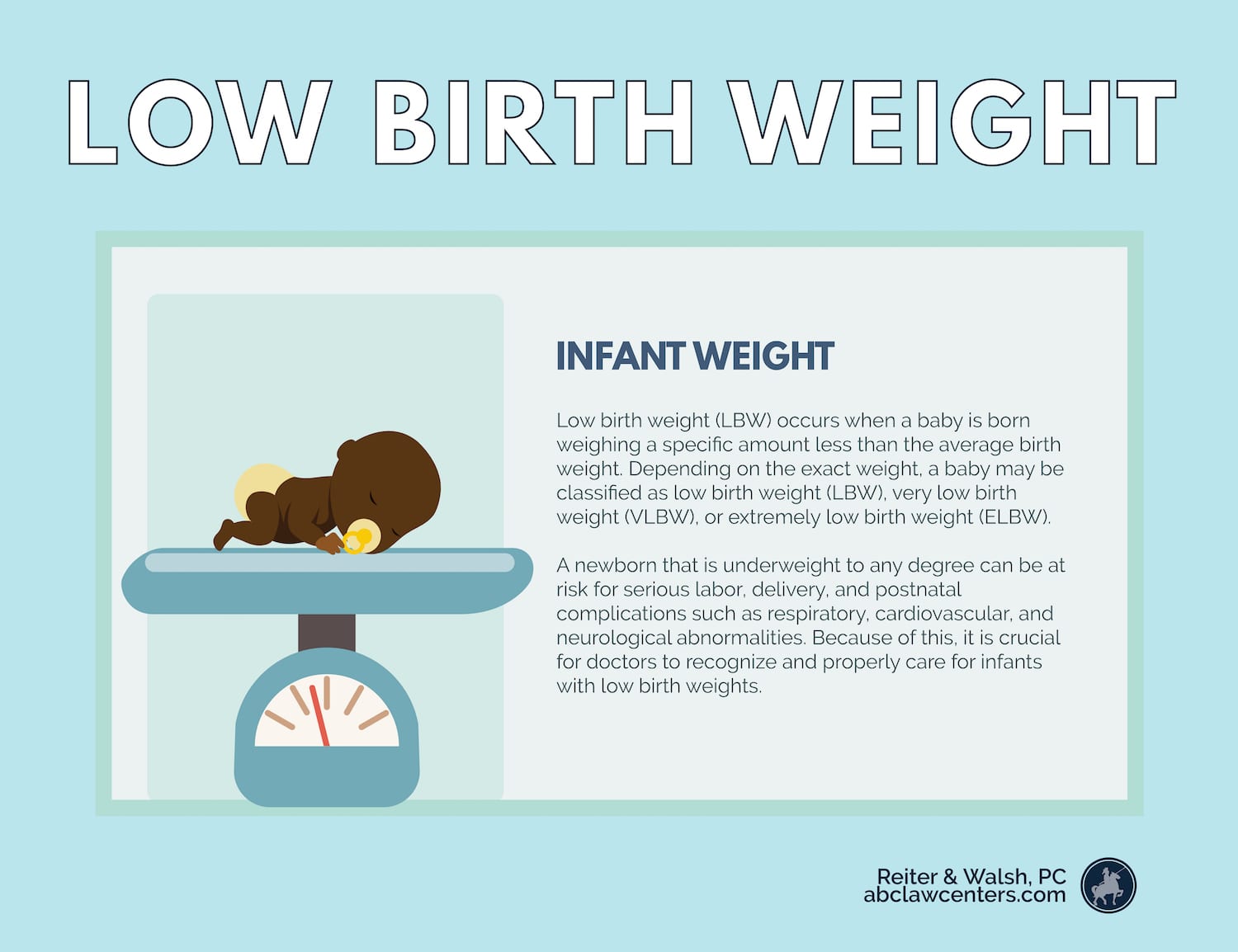Low Birth Weight Infants
On average, healthy babies born at or near term weigh between 5 pounds, 8 ounces (2,500 grams) and 8 pounds, 13 ounces (4,000 grams). When a baby weighs less than these values at birth, they are considered to have a low birth weight. Depending on the exact weight, a baby may be classified as low birth weight (LBW), very low birth weight (VLBW), or extremely low birth weight (ELBW). A newborn that is underweight to any degree can be at risk for serious labor, delivery, and postnatal complications such as respiratory, cardiovascular, and neurological abnormalities. Because of this, it is crucial for doctors to recognize and properly care for infants with low birth weights.

Categorizing Low Birth Weight
A low birth weight infant is defined by the World Health Organization (WHO) as any baby born under 2,500 grams. Within the broad category of low birth weight infants, there are two subcategories – very low birth weight (VLBW) and extremely low birth weight (ELBW). The distinctions for each degree of low birth weight are as follows (2):
- Low birth weight (LBW) – A birth weight less than 2,500 grams
- Very low birth weight (VLBW) – A birth weight less than 1,500 grams
- Extremely low birth weight (ELBW) – A birth weight less than 1,000 grams
It is important to note that these newborn weight designations differ from the terms small for gestational age (SGA), appropriate for gestational age (AGA), and large for gestational age (LGA) which take into account the gestational age alongside the weight and body proportions of a newborn, rather than just the weight alone (2). These two classification systems can be used in tandem with one another to create a more accurate clinical picture of the newborn.
Causes of Low Birth Weight in Newborns
When a baby is born with a lower than average birth weight, it is almost always the result of one of two primary causes:
- Premature birth: When a baby is born before 37 weeks, this is considered premature. Because premature babies have less time to develop in the womb than those born at term, they are more likely to have low birth weights. In fact, an estimated 70% of babies classified as low birth weight are born prematurely (3).
OR
- Fetal growth restriction: When a fetus is growth-restricted, it is unable to gain the weight it is supposed to before birth. Growth restriction can be the result of many factors including inadequate nutrition, maternal health conditions, placental perfusion issues, birth defects, intrauterine growth restriction (IUGR), and more (3). When these issues limit fetal growth, it is likely the baby will be born with a LBW.
Fetal growth restriction and premature birth often occur together, in which case they may both contribute to the birth of a LBW, VLBW, or ELBW baby.
Risk Factors for Low Birth Weight in Newborns
Because low birth weight often stems from premature birth or fetal growth restriction, any condition or factor that increases the chance that either will occur is considered a risk factor for LBW. The following are some examples (4):
- Maternal high blood pressure (preeclampsia)
- Gestational diabetes
- Maternal infections
- Placental perfusion issues
- Prior history of a low birth weight baby
- Multiple gestations (twins, triplets, etc.)
- Placenta previa and/or placental abruption
- Incompetent cervix
- Previous pregnancy resulting in LBW baby
- Extremes of maternal age (under 15 years old or over 35 years old)
- Environmental factors such as smoking or alcohol use
When risk factors for premature birth, fetal growth restriction, or low birth weight are present, doctors must recognize them and properly act in order to protect the mother and baby. Because labor, delivery, and postnatal care can be more difficult when a very small baby is involved, it is essential that professionals are cognizant of LBW infants during the entire course of treatment. If medical professionals do not act in a way that is consistent with the standard of care, this is medical negligence. If the baby or mother is injured due to medical negligence, it is medical malpractice.
Long-Term Outcomes for Low Birth Weight Newborns
Babies with low birth weight are more likely to develop health problems than babies of average weight. In addition, if labor and delivery are not handled properly, LBW infants are at risk for serious birth injuries. Common health concerns that may develop in babies with LBW, VLBW, and ELBW include:
- Respiratory distress syndrome
- Brain hemorrhages (bleeds)
- Cerebral palsy (CP)
- Hypoxic-ischemic encephalopathy (HIE)
- Periventricular leukomalacia (PVL)
- Necrotizing enterocolitis (NEC). NEC is an infection that destroys the intestines.
- Patent ductus arteriosus (PDA). PDA is a heart condition in which a large artery in the heart (the ductus arteriosus) fails to close after birth, leading to heart failure.
- Neonatal sepsis
- Retinopathy of prematurity (ROP). ROP impacts blood vessels in the eye and in severe cases can lead to loss of vision.
Newborns with LBW, VLBW, or ELBW face significantly more risk for injury at or around the time of birth than do newborns of average weight. In addition, studies have found that lower birth weights are linearly correlated with increased injury incidence, meaning that infants with VLBW or ELBW may be at an even more significant risk than those in the LBW category (1). It is essential that doctors take this risk into consideration when developing a treatment and care plan for newborns during this crucial period.
The above is intended solely as an informational resource and should not be construed as medical advice. For medical questions, please contact a medical professional.


ABC Law Centers: Birth Injury Lawyers | Michigan Birth Injury Attorneys Helping Children Since 1997
Birth injury is a difficult area of law to pursue due to the complex nature of the medical records. The award-winning birth injury attorneys at ABC Law Centers: Birth Injury Lawyers have decades of joint experience with birth injury cases. To find out if you have a case, contact our firm to speak with one of our birth trauma attorneys. We have numerous multi-million dollar verdicts and settlements that attest to our success, and no fees are ever paid to our firm until we win your case. We give personal attention to each child and family we help, and our award-winning attorneys are available 24/7 to speak with you.
Featured Videos
Posterior Position
Hypoxic-Ischemic Encephalopathy (HIE)

Featured Testimonial
What Our
Clients Say…
After the traumatic birth of my son, I was left confused, afraid, and seeking answers. We needed someone we could trust and depend on. ABC Law Centers: Birth Injury Lawyers was just that.
- Michael


